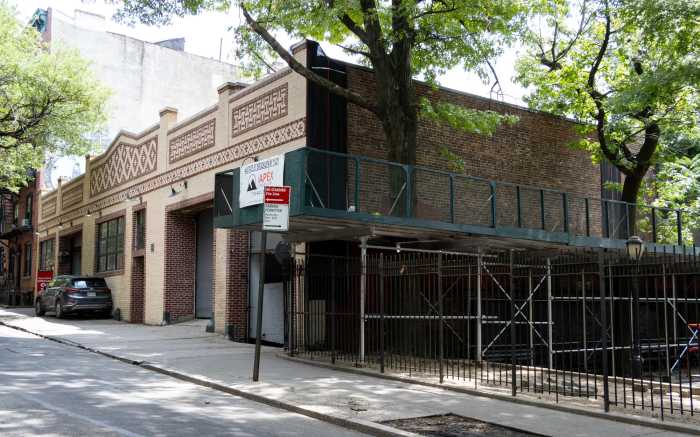Two organizations that have been meeting with Forest City Ratner officials
over a community benefits agreement tied to Atlantic Yards may be rewarded
with jobs if the basketball arena, office skyscraper and apartment high-rise
plan gains government approvals.
Members of both BUILD (Brooklyn United for Innovative Local Development)
and the New York chapter of ACORN (Alliance of Community Organizations
for Reform Now) — which both support the Forest City Ratner plan
— say they are already providing to the developer services for which
they could later be hired, acting as community gateways to jobs and housing.
Ratner plans to build Atlantic Yards on 24 acres of public and private
property bounded by Dean Street and Flatbush, Atlantic and Vanderbilt
avenues in Prospect Heights.
James Stuckey, executive vice president of Forest City Ratner, announced
at a public meeting on Nov. 29 that he hoped to bring ACORN on as the
community’s sponsor once the city Department of Housing Preservation
and Development (HPD) granted his company tax abatements connected to
the construction of affordable housing on the site.
Carol Abrams, an HPD spokeswoman, said her agency requires a community
sponsor in any cases where developers receive tax abatements or relief
that is paid for by city taxpayers. That group, she said, is chosen at
the developer’s discretion.
HPD entrusts the chosen community group with marketing and leasing the
project’s housing component, but still monitors the administration
of the lottery-style application process through which tenants are selected
for the affordable housing. As proposed, Ratner’s project would include
2,000 units of tax-abated housing and 4,500 units in total.
But at the Nov. 29 public meeting, the motives of both ACORN, a nationwide
organization of low- and moderate-income families, and BUILD, a community
group formed for the express purpose of finding jobs from the Atlantic
Yards project, were called into question. An audience member asked if
members of the two groups were getting paid by Forest City Ratner for
their support of the project.
Stuckey balked, and refused to answer the question, instead saying, “Why
don’t you ask them yourself?”
A chorus of boos came from the ACORN and BUILD activists who largely packed
the audience. Afterwards, Stuckey told The Brooklyn Papers he didn’t
answer the question because, “It was insulting. Of course, BUILD
and ACORN are not getting paid.”
Bertha Lewis, Brooklyn director for ACORN, called the accusation ridiculous.
“We’ve built housing for over a million people. I raise two
to three million dollars a year,” Lewis told The Papers. “It
just says to me, ‘This is exactly why people think stuff boils down
to race and class.’ It’s like, how dare you?
“We got paid? We got paid with the biggest housing program that has
our name on it that you can imagine. We’re gonna be famous!”
she said, referring to the 50 percent affordable housing, compared to
the typical 20 percent found in most modern developments with an affordability
incentive, that Ratner has agreed to include in Atlantic Yards.
“The cry for 80-20 will never be heard again,” Lewis said.
Patti Hagan, a Prospect Heights resident and ardent anti-Atlantic Yards
activist, said she was suspicious of BUILD and ACORN’s relationship
with Ratner since they are the primary negotiators for the community.
“I think that is a concern, if they are paid supporters for the Ratner
project,” Hagan told The Papers. “I think it’s a question
of which community are we talking about? If they are being paid, it compromises
them as free agents in negotiating a community benefits agreement.”
Asked if using ACORN as the housing sponsor and BUILD as an employee recruiter
would give the appearance that Forest City Ratner was rewarding those
groups for their early and vocal support of the project, at the expense
of other community groups, Forest City Ratner spokeswoman Lupe Todd said,
“No, because we’ve been meeting with so many groups, and will
continue to do so.” All of ACORN’s employees are paid through
a combination of private donations, gifts, loans and grants the non-profit
organization receives through its 501c3 status to develop affordable housing.
The New York chapter was formed 22 years ago.
BUILD is a volunteer-run Prospect Heights-based organization that sprung
up at the first introduction of the arena project, whose leaders positioned
the group from the get-go as an organization that sought to get unemployed
local residents jobs in Ratner’s existing and proposed projects,
including the Atlantic Center and Atlantic Terminal malls that neighbor
the western tip of the proposed Atlantic Yards site.
Build Vice President Marie Lewis, no relation to ACORN’s Bertha Lewis,
said, “First of all, that allegation is so redundant, and we’ve
refused it so many times that it’s ridiculous … if someone looked
at our bank accounts it would show that we haven’t received any money
from the developer.” If Ratner gets the necessary approvals to build
Atlantic Yards, then there may be a payroll spot for BUILD, she said.
She said BUILD has compiled a database of potential applicants —
500 to 600 so far — that she is sure will be used by Forest City
Ratner when it comes to hiring employees locally.
“Lots of people are looking for retail work, lots of people are looking
for potential management positions,” Marie Lewis said. “There
are folks with bachelor’s degrees, with master’s degrees, and
there are people with very little education at all.”
In addition, she said 300 to 400 local businesses that have expressed
interest in being used as contractors to build Atlantic Yards or to lease
space have also been logged.
Asked if she was concerned that individuals and businesses unfamiliar
with BUILD could be left out of the database and lose a chance in line,
Marie Lewis said that was something the group hoped to expand upon in
their partnership with Forest City Ratner.
“Outreach will be an ongoing issue,” she said. “Based on
what we’ve done thus far, it’s just been us working on this
as volunteers. Once the agreement is reached … and you have a program,
and a staff, now that expands our capacity to do outreach and connect
with the people.”
Asked if Forest City Ratner would be paying for the staffing, she laughed.
“We’re still negotiating who’s paying for what right now,”
BUILD’s Lewis said. “We’re looking at different things.
























